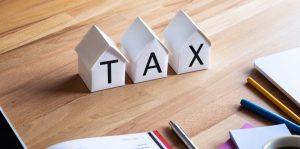NJ Tops List – Has Highest Property Taxes in the Country…Again
 New Jersey doesn’t top many lists. For instance, U.S. News & World Report ranks it 49th in fiscal stability, 45th in opportunity, 31st in economy, and 19th overall. New Jersey Rankings | U.S. News Best States. But there is a list where the Garden State is safely at number 1: high property taxes.
New Jersey doesn’t top many lists. For instance, U.S. News & World Report ranks it 49th in fiscal stability, 45th in opportunity, 31st in economy, and 19th overall. New Jersey Rankings | U.S. News Best States. But there is a list where the Garden State is safely at number 1: high property taxes.
New Jersey has the highest property taxes in the country. The median property tax bill is $9,412. That’s $1,698 more than the runner up, New Hampshire, and three times the national average of $3,500! New Jersey has highest property taxes in US. Why are property taxes higher than ever, and will this trend ever come to a halt? Let’s dive in!
The Trend Continues
New Jersey has carried the nation’s highest property tax burden for a while. The average tax bill has consistently increased year after year, reaching a record high of over $10,000 this past March! The average NJ property-tax bill in 2024 was record-high $10,095 | NJ Spotlight News. Why does New Jersey continue to reach the top of the property tax list? There are a few reasons that likely play a role:
- High Population Density: It may be known as the Garden State, but New Jersey is also the most densely populated. With so many people, it can be expensive to fund schools, police, and infrastructure.
- Local Government Fragmentation: New Jersey has many municipalities and over 600 school districts. While having numerous local governments and schools has certain benefits, there is a greater risk for administrative redundancies and higher costs.
- Heavy Reliance on Property Taxes for School Funding: Speaking of schools, New Jersey public school systems heavily depend on property taxes. This is in contrast to other states which mainly fund schools through sales or income tax. Given the population density, school systems require larger amounts of funding relative to other states.
- High Labor and Legacy Costs: New Jersey’s government employees have some of the best wages and benefits in the public sector. Providing these benefits comes at a cost, though. In addition, the state requires funding for pension obligations and healthcare costs for retired employees.
- Limited Alternative Revenue Streams: Although New Jersey’s property taxes are very high, its sales and income taxes are rather moderate. This means very few alternatives for funding.
Will The Trend Continue?
New Jersey property taxes can feel like a second mortgage for many homeowners. Unfortunately, it doesn’t look like the trend of increasing taxes will slow down anytime soon. The state’s budgetary needs continue to climb higher, creating greater demand for property tax revenue. New Jerseyans, Expect Tax Policy Changes in 2026 | MROD. This has been a major factor in outmigration of retirees and middle-income families. In addition, it has caused an increased in demand for tax relief programs as well as mounting political pressure on state lawmakers to reform the system.
Southern States
Meanwhile, residents of southern states like Tennessee, South Carolina, and Louisiana generally pay a fraction of New Jersey’s enormous property taxes. There are several reasons for this, including lower property values, fewer local governments, and alternative sources of revenue such as sales and income tax. Many southern states also offer homestead exemptions, providing tax relief on primary residences. This helps protect homeowners from large increases. Now that’s southern hospitality!
Appealing Your Assessment
Fortunately for New Jerseyans, there are several ways to achieve tax savings. For more information, read our post on ways to save thousands. New Jersey Property Tax Relief | MROD.
One way homeowners may save is by is exercising their right to appeal their assessments. Every county in New Jersey has a board of taxation who hears property tax appeals. In addition, the state is one of very few with its own Tax Court. Unlike civil courts which hear a wide range of matters, The Tax Court of New Jersey is devoted to state and local taxation issues. Tax Court judges possess thorough knowledge of property tax law which can contribute to fair and efficient resolutions of tax appeals.
Conclusion
The trend of rising property taxes does not look like it will change anytime soon, but a silver lining is that property owners in New Jersey have many options to save money. One of the best ways is to check if your property is over-assessed by contacting an experienced property tax attorney. At McKirdy, Riskin, Olson & DellaPelle, our experienced attorneys have saved homeowners thousands on property taxes. Contact us for a complimentary review of your property tax assessment.







